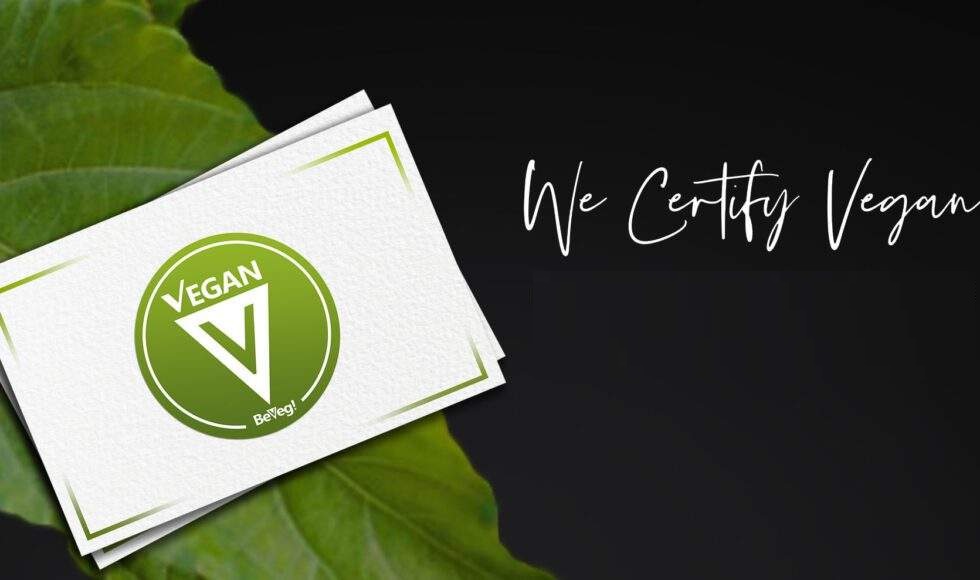Vegan Certification: Standards, Process & Costs

Want to know why vegan certification is important? It’s all about making sure products follow good rules. Certifications show that stuff is made right and helps the planet. People like certified products because they’re honest and don’t hurt animals. Let’s see how vegan certification changed things in the food world and more.
Certified Vegan Logo
Significance
The Certified Vegan Logo holds immense importance for consumers looking for vegan products as it guarantees that the items are entirely free from animal-derived ingredients. This simplifies the shopping experience, ensuring vegans can make informed choices effortlessly. The logo’s presence signifies a commitment to ethical and cruelty-free practices in product manufacturing.
The Vegan Awareness Foundation plays a crucial role in advancing veganism through the logo by setting strict criteria for certification. By promoting this symbol, they raise awareness about vegan options, making it easier for individuals to align their purchases with their values.
Global Recognition
The Certified Vegan Logo enjoys widespread recognition across the globe, instilling trust in consumers regarding the authenticity of vegan products. Its global acceptance not only boosts consumer confidence but also drives sales for companies displaying the logo prominently. Countries like the USA, Canada, Australia, and many European nations permit and acknowledge this symbol on products.
Marketing Impact
Displaying the Certified Vegan Logo can significantly enhance a company’s marketing efforts by appealing to the growing base of consumers interested in vegan alternatives. The logo acts as a powerful marketing tool, attracting a broader audience seeking ethical and sustainable products. Through this certification, companies can witness an increase in sales volume and heightened brand visibility in the competitive market landscape.
Vegan Standards Overview
No Animal Products
Vegan certification entails stringent guidelines ensuring no animal products are used in items bearing the Certified Vegan Logo. Prohibited ingredients encompass meat, dairy, and honey to uphold vegan principles. Adherence to these standards is crucial for obtaining certification.
No Animal Testing
The certification process strictly prohibits animal testing for both ingredients and final products. Emphasizing cruelty-free practices is paramount in vegan product manufacturing. Eligibility for certification mandates a timeline restriction on any past or ongoing animal testing activities.
No Animal GMOs
Vegan products must refrain from utilizing animal-derived GMOs or genes to maintain genetic integrity. Upholding ethical sourcing and production practices underscores the commitment to avoiding animal GMOs in vegan manufacturing processes.
Certification Criteria
Product Eligibility
To qualify for the Certified Vegan Logo, products must adhere to strict guidelines ensuring no animal-derived ingredients are used. Various categories like food, cosmetics, and clothing can seek certification. This process promotes inclusivity across multiple industries.
For food items, meeting the criteria means excluding meat, dairy, eggs, honey, gelatin, and other animal by-products. Cosmetics should avoid ingredients like beeswax and lanolin. Clothing must not contain materials like leather or wool. The diversity of eligible products showcases the widespread impact of veganism.
Company Compliance
Companies play a crucial role in upholding vegan standards by ensuring all their products meet the certification requirements. They need to source ingredients that align with vegan principles and implement stringent measures to prevent cross-contamination with non-vegan items. Maintaining transparency is key.
To maintain vegan integrity, companies should regularly review their supply chains to guarantee compliance at every stage of production. Implementing clear labeling and providing detailed information about sourcing practices demonstrate accountability. Transparency builds trust with consumers seeking ethically produced goods.
Certification Process
Application Submission
Companies interested in obtaining certification must initiate the application process by submitting relevant documentation. This includes detailed information about their manufacturing processes and ingredients used. The initial submission requires companies to provide comprehensive data on their products.
To begin the certification process, companies need to submit various documents such as ingredient lists, production methods, and potential sources of contamination. These details are crucial for assessing compliance with vegan standards. The application submission is a critical first step towards achieving certification.
Verification Procedures
Verification procedures play a vital role in ensuring that products adhere to vegan standards. Inspections are conducted to verify that all ingredients and manufacturing processes align with the criteria set by the certification body. This rigorous process guarantees the integrity of the Certified Vegan Logo.
The inspection process involves thorough checks on ingredients, production facilities, and supply chains to confirm compliance with vegan requirements. By conducting meticulous verifications, certification bodies uphold the credibility of the certification mark. Maintaining strict verification procedures is essential for preserving consumer trust in vegan products.
Certification Costs
Fee Structure
The licensing fee for vegan certification typically includes an application fee and an annual licensing fee. Companies must pay the application fee when applying for certification. Once certified, they need to cover the annual licensing fee to continue using the Certified Vegan Logo. This financial commitment is essential for maintaining the vegan certification status.
- Application fee and annual licensing fee are mandatory costs.
- Companies bear these expenses to display the Certified Vegan Logo.
- Financial commitment is crucial for obtaining and keeping the certification.
Cost Justification
The benefits of vegan certification outweigh the associated costs. Companies can expect a significant return on investment by displaying the Certified Vegan Logo. The certification costs are justified by the value it brings in terms of attracting vegan consumers and enhancing brand credibility.
- Benefits of certification justify the costs involved.
- Displaying the logo can result in a substantial ROI.
- Certification costs align with reaching vegan consumer demographics.
Marketing Certified Products
Branding Strategies
Companies can leverage the Certified Vegan Logo by prominently displaying it on their product packaging. This logo acts as a powerful visual cue, instantly communicating to consumers that the product meets strict vegan standards. By incorporating the logo into their branding, companies can attract environmentally conscious consumers seeking ethical and sustainable products.
Incorporating vegan certification into brand messaging enhances a company’s reputation among consumers who prioritize ethical consumption. Brands can capitalize on the growing demand for vegan products by highlighting their commitment to sustainability and animal welfare through the Certified Vegan Logo. This transparent approach resonates with consumers looking for products aligned with their values.
Successful branding strategies using the Certified Vegan Logo include showcasing the logo on all marketing materials, emphasizing the ethical aspects of production processes, and engaging with eco-conscious influencers to reach a wider audience. Companies like Beyond Meat and Oatly have effectively utilized the logo to differentiate themselves in the market and appeal to a broader consumer base.
Consumer Trust
Certification plays a crucial role in building consumer trust in vegan products. The presence of the Certified Vegan Logo assures consumers that the product has undergone rigorous evaluation to meet vegan standards, instilling confidence in their purchase decisions. This transparency fosters trust between brands and consumers, leading to long-term relationships based on credibility and authenticity.
The Certified Vegan Logo reassures consumers about product authenticity by providing clear information about ingredients and manufacturing processes. This transparency eliminates doubts regarding hidden animal-derived components, offering peace of mind to conscientious shoppers. By prioritizing certification, brands demonstrate their commitment to integrity and consumer well-being.
Consumer loyalty and repeat purchases are significantly influenced by trust in product claims and certifications. When consumers feel confident in a brand’s dedication to vegan principles, they are more likely to become loyal customers who advocate for the brand within their social circles. Building trust through certification establishes a strong foundation for long-term brand success.
Industry-Specific Insights
Food and Beverage
Vegan certification plays a crucial role in the food and beverage industry, ensuring products meet ethical standards. Companies face challenges such as sourcing sustainable ingredients but benefit from tapping into a growing market segment. Consumers increasingly seek vegan options, driving companies to obtain certification to cater to this demand.
Cosmetics
In the cosmetics sector, vegan certification signifies a commitment to cruelty-free practices and aligns with consumer preferences for ethical products. The shift towards vegan beauty items reflects a broader trend of conscious consumerism. Brands leveraging vegan certification witness enhanced brand loyalty and appeal in their marketing strategies.
Global Vegan Trends
Market Growth
The vegan market has been experiencing substantial growth, with the vegan diet gaining popularity worldwide. Certification plays a crucial role in this growth by ensuring transparency and trust for consumers. As more people adopt plant-based lifestyles, businesses are recognizing the need to obtain vegan certification to meet the rising demand.
A significant driver of this growth is the expanding consumer base actively seeking out vegan products and services. With an increasing awareness of health, environmental, and ethical concerns, consumers are turning to vegan options for a sustainable lifestyle. This shift has created a vast market opportunity for businesses that embrace vegan certification, catering to the evolving needs of their customers.
Consumer Preferences
Consumer preferences are steadily shifting towards vegan products, driven by various factors such as health consciousness, animal welfare, and environmental sustainability. The rise of veganism reflects a cultural shift towards more mindful consumption habits. Businesses must adapt to these changing preferences by offering diverse vegan options and aligning their values with those of their customers.
Understanding and responding to consumer preferences are paramount in product development within the vegan market. By prioritizing quality, innovation, and ethical standards, companies can attract a loyal customer base seeking authenticity and sustainability in their purchases.
Summary
You’ve now learned about the importance of vegan certification, the standards, criteria, process, costs, and how to market certified products. Understanding these aspects is crucial for businesses looking to tap into the growing market of vegan consumers. By obtaining vegan certification, you not only meet the ethical demands of your customers but also gain a competitive edge in the industry. Stay informed about global vegan trends and industry-specific insights to stay ahead in this ever-evolving market.
Make sure to implement these insights into your business strategy to attract more conscious consumers and enhance your brand reputation. Get started on the certification process today and position your products as trustworthy and ethical choices for the expanding vegan community.
Frequently Asked Questions
What does the Certified Vegan Logo signify?
The Certified Vegan Logo indicates that a product has met the strict criteria set by a certification body to ensure it contains no animal-derived ingredients and has not been tested on animals.
How are vegan standards overview helpful for consumers?
Vegan standards overview help consumers understand the requirements products must meet to be considered vegan, providing transparency and assurance about their ethical choices.
What are the typical certification criteria for vegan products?
Certification criteria for vegan products usually involve verifying the absence of animal-derived ingredients, ensuring no animal testing was conducted, and meeting specific ethical and environmental standards.
How can companies navigate the certification process for their products?
Companies can navigate the certification process by submitting their products for review, providing necessary documentation, undergoing inspections if required, and complying with the established vegan standards.
Are there significant costs involved in obtaining vegan certification?
While costs may vary depending on factors like product complexity and certification body, obtaining vegan certification generally involves fees for application, evaluation, and ongoing monitoring to maintain compliance.



